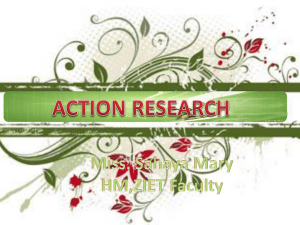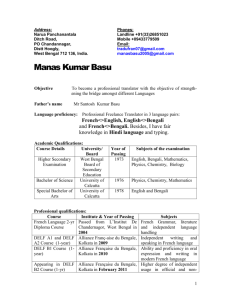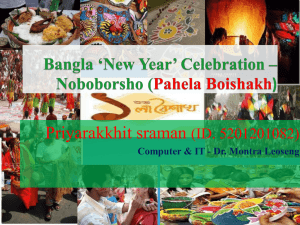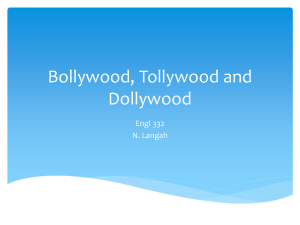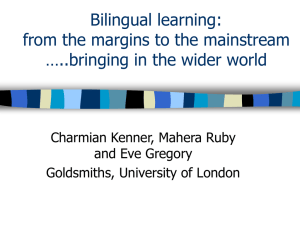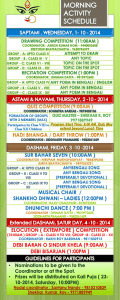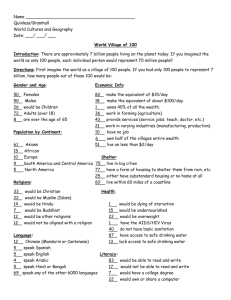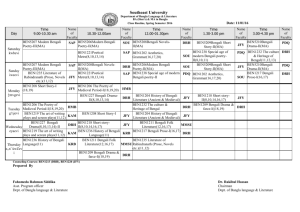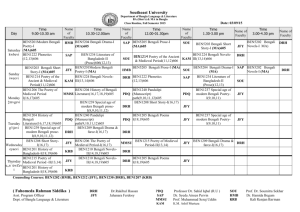Abstract - LLAS Centre for Languages, Linguistics and Area Studies
advertisement
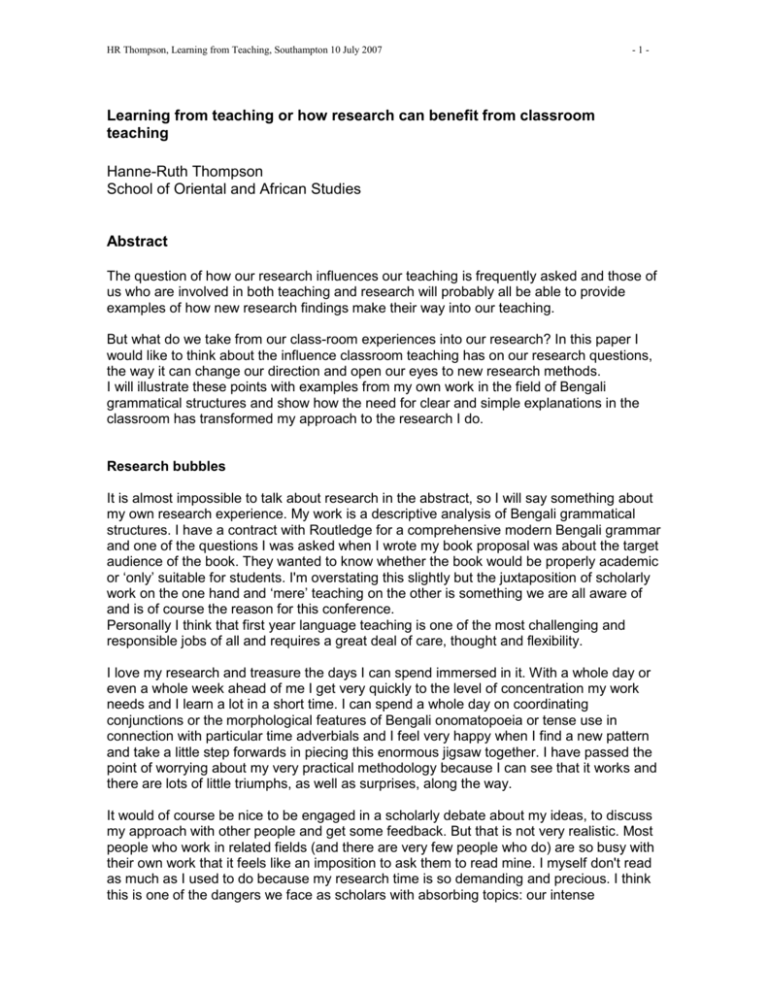
HR Thompson, Learning from Teaching, Southampton 10 July 2007 -1- Learning from teaching or how research can benefit from classroom teaching Hanne-Ruth Thompson School of Oriental and African Studies Abstract The question of how our research influences our teaching is frequently asked and those of us who are involved in both teaching and research will probably all be able to provide examples of how new research findings make their way into our teaching. But what do we take from our class-room experiences into our research? In this paper I would like to think about the influence classroom teaching has on our research questions, the way it can change our direction and open our eyes to new research methods. I will illustrate these points with examples from my own work in the field of Bengali grammatical structures and show how the need for clear and simple explanations in the classroom has transformed my approach to the research I do. Research bubbles It is almost impossible to talk about research in the abstract, so I will say something about my own research experience. My work is a descriptive analysis of Bengali grammatical structures. I have a contract with Routledge for a comprehensive modern Bengali grammar and one of the questions I was asked when I wrote my book proposal was about the target audience of the book. They wanted to know whether the book would be properly academic or ‘only’ suitable for students. I'm overstating this slightly but the juxtaposition of scholarly work on the one hand and ‘mere’ teaching on the other is something we are all aware of and is of course the reason for this conference. Personally I think that first year language teaching is one of the most challenging and responsible jobs of all and requires a great deal of care, thought and flexibility. I love my research and treasure the days I can spend immersed in it. With a whole day or even a whole week ahead of me I get very quickly to the level of concentration my work needs and I learn a lot in a short time. I can spend a whole day on coordinating conjunctions or the morphological features of Bengali onomatopoeia or tense use in connection with particular time adverbials and I feel very happy when I find a new pattern and take a little step forwards in piecing this enormous jigsaw together. I have passed the point of worrying about my very practical methodology because I can see that it works and there are lots of little triumphs, as well as surprises, along the way. It would of course be nice to be engaged in a scholarly debate about my ideas, to discuss my approach with other people and get some feedback. But that is not very realistic. Most people who work in related fields (and there are very few people who do) are so busy with their own work that it feels like an imposition to ask them to read mine. I myself don't read as much as I used to do because my research time is so demanding and precious. I think this is one of the dangers we face as scholars with absorbing topics: our intense HR Thompson, Learning from Teaching, Southampton 10 July 2007 -2- preoccupation with our work leads us into an enclosed bubble, which may be full of light and colour, but is nevertheless cut off from the rest of the world. The rest of the world is not interested in our questions, our uncertainties and our learning steps but in our results, our answers and in our publications. And although that makes research at times a solitary pastime, on the whole perhaps this is a good thing because it gives us a clearly defined goal. Our work as scholars, however many years we have toiled and brooded over it, only becomes real and valid when the bubble is burst and we present the finished and polished product to the rest of the world. That's why as scholars we need not only those submission dates for our books but above all our students. Although I love the days when I can submerge in my grammar, it is my students who remind me that the real purpose of my research is not at all ‘academic’ but very specific. The reson for doing this research is that I want to communicate my joy and excitement in this language and I want to show people how Bengali works. I want to help teachers to teach this language and learners to learn it. And I want to convey to at least a few Bengali linguists and teachers that Bengali grammar is not all about Sanskrit and historical derivations and prescriptive school books but that there is a lot to find out about this language which is quite new and very interesting, even to them. Teaching is a way of communication and communication is always a two-way happening, not as concentrated, pure and perfect as solitary research but more human, more mixed-up and much more real. My students and my teaching help me to keep my feet on the ground. New discourses I could give you a number of specific instances where my students' queries led me to look at my research questions from a new angle and occasionally change track altogether. But instead I want to tell you about a very recent experience which has had a rather profound effect on the way I think about my work and about its purpose. In my Bengali 1 class this year I had a PhD student, John, who wanted to learn some Bengali in preparation for a whole year of postcolonial studies in Kolkata. He was one of those very bright, attentive students who are a pleasure to teach. He also knew almost nothing about language structures. One day, when I was demonstrating the object case endings for animate nouns in Bengali, he asked: 'But why do we need these cases?' A very good question but my first, instinctive reaction was to think ‘How can someone so intelligent be so ignorant of language structures?' Well, John turned the tables on me when a few weeks later he gave a talk on postcolonial studies in our course on Modern Bengal. He was talking about the French historian Michel Foucault and his concept of discourse. Here is the quote: Foucault thought that the relationship between power and knowledge was so strong that he combined the two terms into a single concept - power/knowledge. Foucault called systems of knowledge discourses. A discourse is a set of both ideas and practices of behaviour which regulate people’s conduct and define how things are thought about. Foucault analyzed a series of different discourses, and tried to show how they regulated the behaviour of societies, how they influenced what people did and how they thought, and even how they affected people’s most personal feelings and desires. He looked at how the organization of knowledge through particular practices of language sets limits on what it is possible to say or to think. HR Thompson, Learning from Teaching, Southampton 10 July 2007 -3- Foucault argued that the very notion of the individual, and one’s own sense of having an identity as an individual, was the effect of power/knowledge. People conceive of their identity in relation to the identities of others. Categories of identity are regulated by discourses and exist in relationship to each other. Now this was very interesting to me for two reasons: firstly because I had never quite so consciously considered that our own personal feelings and ways of thinking are not really individual characteristics but are predetermined by the society we live in. Secondly, very pointedly, the role of language in this. Let me give you the sentence again: 'The organization of knowledge through particular practices of language sets limits on what it is possible to say or to think'. This is familiar territory to a linguist in an abstract sort of way and in connection with far-away American-Indian languages, but for me it had at that moment a very immediate and radical impact. Over the last few years of teaching at undergraduate level, I have become more and more aware that the majority of our students have no previous knowledge of language structures whatsoever. I've been giving them a glossary of grammar terminology, but although the terminology is essential equipment for learning a language, the students' first encounter with this particular discourse needs to be guided and prepared on a much more basic level. Instead of being mildly irritated at having to explain to them things which I consider general knowledge, I now look at this more as a Crocodile Dundee situation - a real step into unfamiliar territory for the students and a challenging opportunity for me, not only as a teacher but, perhaps more importantly, on the research front. This one sentence in John's talk was such a wake-up call to me that I was immediately ready to incorporate this into my own thinking and methodology. In hindsight it is clear to me now that I must have been ready for it and that it complemented some of my own grammatical thinking. All it needed now was to make the connection, and in making the connection the juxtaposition of teaching and research becomes almost meaningless. Rather than confronting the students with this big, alien discourse of Bengali and a whole lot of grammatical terminology to learn (why do we need these cases?), I can now allow them to take their own tentative steps in this new territory of language awareness and discover the joys of Bengali at the same time. I would not be able to do this if I did not have my research and if I did not feel thoroughly at home in the realm of Bengali grammar. Finding the balance In my preparation for a new Bengali grammar I spend a lot of time thinking about grammatical definitions, categorisations, syntactic dependence and such things. It has been obvious to me for a long time that (1) grammatical description is a matter of trial and judgement, a way of carefully measuring and designing a tailor-made cloak to fit around language structures and (2) ready-made garments (grammars) don't fit. That means that I have to do a lot of rethinking of traditional concepts, even such apparently fixed categories as word classes. But what are the implications of this tailor-made cloak? I used to be very skeptical of grammar theories because of their inherent remoteness from ordinary life, even ordinary language. What is the point of being a linguist if not to use our language skills for communication? And what communication occurs in a theoretical treatise on pronominalisation in Bengali? Very little that is of real use to anyone other than theoretical linguists. Now that I'm in the process of writing my own description of this language, I can see for the first time how attractive the idea of a new grammar would be. I could redefine all existing grammatical categories and rearrange them to fit perfectly. I would redefine the category of subject: Bengali has a lot of non-nominative 'subjects' and quite a few HR Thompson, Learning from Teaching, Southampton 10 July 2007 -4- 'subjectless' structures. I would have to rearrange some word classes, reorganise the concepts of coordination and subordination, rename tenses and so on. If I did this, I might finish up with a flawless bespoke garment for this language. But at what price? I would set myself apart from all the scholars who have worked on this before and I would fail in my aim of communication, real, tentative, human communication. A new Bengali language pedagogy, as I grandly call it, has to be based not in abstract ideas and perfect visions but in the real world. It has to take into account what other scholars have thought and done and it has to provide new learners with stepping stones into this unfamiliar territory. It has to bring together scholarly work and beginner classes. It has to link research and teaching. Learning from teaching What does this mean in practice? I found that it is not so difficult to introduce someone to language awareness. After our classes this year were over and before John left for Kolkata, I had a session with him on his own. For the first quarter of an hour we made up a number of random English sentences and then looked at how these sentences were formed. Which bits could be left out without affecting the basic structure of the sentence? Which parts of the sentence dominated the other parts? A sentence starting with 'my father' can go any which way, but a sentence containing the word 'gives' automatically calls for certain other elements. And so on. It did not take John very long to get a basic understanding of sentence structure, and I stayed clear of grammatical terminology until he wanted to know 'Well, what do you call this then?' He himself had discovered something new that he now needed a name for and having got the name he had acquired a new way of thinking about things. For my research it means that I keep in mind what other people will need and want to know about this language, that I try to present my findings in a clear and simple way, and that I show how Bengali works through examples rather than through theoretical speculation. I would like to conclude this talk with two potentially controversial points which for me sum up what we can take from our class room teaching into our elevated scholarly research bubbles. (1) In order to be effective and meaningful, we need to look at the specifics, not at the generalities of a subject. Apart from my teaching and research, I am on the Bengali team of two British exam boards, one of them processing exams from abroad, the other one Bengali exams in Britain. Three years ago I went to a one-day conference of an organisation which had just been set up with the task of assessing and monitoring exam processes in the UK. They work with various exam boards and aim to improve and standardise the exam procedure. I must admit that I can't remember anything about the conference except that there was a lot of self-promotion and impressive-sounding jargon. I'm sure it was partly to do with the fact that the organisation was still so new but unfortunately in our universities nowadays we see a lot of this planning of strategies and setting up of assessment procedures and assessing the assessment procedures, all of which costs a lot of energy and uses up a lot of words. Things become not only a lot more interesting but also more energising when we get to the specifics – in the class room as well as in our departmental meetings, but above all in our research. HR Thompson, Learning from Teaching, Southampton 10 July 2007 (2) -5- Any logical system (e.g. language), however complex, can be made simple and explained clearly. The idea that long, difficult words and complex sentence structures are a sign of educated and sophisticated thinking is very deeply ingrained in all of us. I myself am very susceptible to linguistic complexities and relish learning obscure, long words and exploring new concepts. But when we want to get our points across we have to balance our sophisticated thinking with our use of language. I know from my own experience that as long as I am still revolving around complexities and difficulties, I have not yet really understood the subject myself. With increasing clarity of thought my language becomes simpler. Of course there are complex issues but we can deal with them by separating out their components, by splitting them into smaller units (one step at a time) until they become digestible. Knowing our stuff can help us to become good teachers. Knowing our students can help us to make our research processes more transparent and accessible and our research findings more useful.
